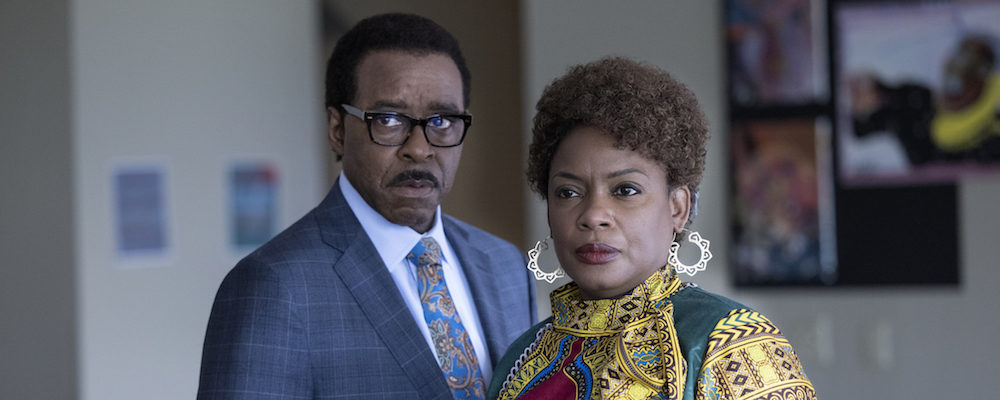AMC’s ‘61st Street’ Drops a Heavy Burden of Proof, but Barely Tips the Scales of Justice
Tony Sokol
Everyone is a hero in their own story, even the villains and victims. AMC’s “61st Street” takes the time to blend social, street, and criminal justice in far more equal terms than usually visible. Much of the series feels derivative of the majority of crime dramas, and the case could have been closed in one episode of “Law & Order,” but the story warrants the continuance. Over eight episodes, “61st Street” tells the story of a Chicago drug bust that ends in two deaths: black gang member Rufus (Kevin Tre’von Patterson), and white cop Mike Rossi (Patrick Mulvey).
Courtney B. Vance plays public defender Franklin Roberts, recently diagnosed with cancer and showing its effects when everyone else’s back is turned, especially from his son David (Jarell Maximillian Sullivan) who is on the autism spectrum. Roberts is nearing the end of his career, and feels he’s got nothing substantial to show for it. Because it is a series, he finds a case to make his mark on Chicago’ criminal justice system: Moses Johnson (Tosin Cole), a high school track star already packed for college, is charged with killing a cop. Television being what it is, Roberts’ wife Martha (Aunjanue Ellis) is a budding politician, running for alderwoman in Chicago’s 5th Ward, who has a problem with the case, even though, ultimately, they are fighting the same battle. She is running on a defund-the-police platform, and he is defending someone with no funds on the run from police.
Moses is not exactly innocent, but is still getting a raw deal. Chicago police Lt. Brannigan (Holt McCallany) is an insidious villain. Corrupt, hate-filled, and blindingly racist, yet so transparently reasonable even the most hardened suspects gladly confess the smallest of infractions just to get on his good side. Reality hits when the first thing they see leaving his office is a Blue Lives Matter flag. They swim in it when he sends suspects on a trip to the river. Brannigan and Roberts have a history.
The accidentally-slain cop’s partner Mike Logan (Mark O’Brien) has a more bare-knuckled and in-your-face approach. Especially on Moses’ brother Joshua (Bentley Green), who he grabs by the collar and commands to “Look at me. You see a blue life that doesn’t matter.” Logan is also keeping a secret, badly, about his dead partner’s covert corruption investigation. There are cracks in the thin blue line which always closes rank in defense or on the offense.
Supporting characters get a tremendous amount of attention, and bring nuance to the suspense. Andrene Ward-Hammond is riveting as Moses’ mother Norma, put through the grind of the system with a fervor reserved for cartel kingpins, and then let go to face the most intimate of harassments. Moses’ friend Calvin (Jayson Lee) sums up the young street community’s “way of thinking” astutely. “Cops see Blackness as a weapon. Being Black is like, I might as well have a gun.”
The ensemble cast presents the testimony through multiple points of view. Chicago street gangs pay up on the low down, prison alliances are as political as any urban council, and the police keep vigilant watch. Moses’ deadbeat father is serving out a prison sentence for his affiliation with the street gang, The Nation. They put out feelers to see if Logan and Brannigan will take a better offer than they get from the whites-only organization, The Brotherhood, to get off their necks and let them earn.
Exteriors are exquisitely shot in Chicago with an almost documentary vibe. The Chicago Police Department has paid out hundreds of millions of dollars in misconduct settlements for the tortures, including electric shock, imposed on African American suspects. There is only one specific mention of a local item in “61st Street,” the shooting of Laquan McDonald, which makes the narrative as universal as the systemic racism in justice.
The soundtrack takes much of the subtlety out of the viewing, often telegraphing revelations long before the viewer should know something is going to be revealed, and lingering on dramatic moments with chordal dissonance far after the point is made. It bathes scenes in the heavy-handed melodrama the series works hard to avoid. Created by Peter Moffat, “61st Street” sets out to balance real-life and fictional depictions of law enforcement. It is deglamorized, straightforward, and just short of hopeful, a perfect first step in a post-police state world. Even in closure, it leaves an open end.
“61st Street” premieres April 10 and airs Sunday at 10 p.m. ET on AMC.

